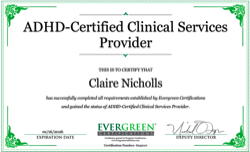It is important to note that anxiety and depression can be comorbid conditions with ADHD, meaning they often coexist. Seeking a formal diagnosis and appropriate treatment plans that include therapy, medication (if necessary), and support can help individuals better manage their ADHD symptoms and address the associated anxiety and depression. Mental health professionals can provide guidance, support, and evidence-based interventions to navigate these challenges effectively.
LATE DIAGNOSIS OF ADHD CAN CONTRIBUTE TO ANXIETY AND DEPRESSION IN SEVERAL WAYS:
Feeling Different and Misunderstood: Individuals who receive a late diagnosis of ADHD may have struggled with their symptoms for years without understanding the underlying cause. This can lead to feelings of confusion, frustration, and a sense of being different or "broken." Being unaware of their ADHD can result in self-blame or internalizing negative feedback from others, contributing to anxiety and low self-esteem.
Chronic Underachievement and Self-Doubt: Many individuals with undiagnosed ADHD experience consistent academic or occupational underperformance, despite their potential. They may struggle to meet expectations, leading to self-doubt and feelings of inadequacy. This chronic pattern of underachievement can contribute to anxiety and depression as individuals may feel trapped by their difficulties.
Impaired Executive Functioning: ADHD often impairs executive functioning, which includes skills such as planning, organizing, prioritizing, and problem-solving. These challenges can result in increased stress levels, as individuals may face difficulties managing time, completing tasks, or staying organized. Persistent struggles in these areas can contribute to anxiety due to the fear of failure and depression as individuals may feel overwhelmed and helpless.
Impulsivity and Emotional Dysregulation: ADHD is associated with impulsivity and difficulty regulating emotions. Impulsive behaviors can lead to negative consequences, strained relationships, and feelings of guilt or shame. Emotional dysregulation can manifest as mood swings, irritability, and difficulties managing stress. These factors can increase vulnerability to anxiety and depression.
Social Challenges and Rejection: Undiagnosed ADHD can also contribute to social difficulties such as problems with listening, interrupting others, or hyperactivity. These challenges may strain relationships, lead to rejection or exclusion, and impact self-esteem. Social rejection and isolation can contribute to anxiety and depression.

